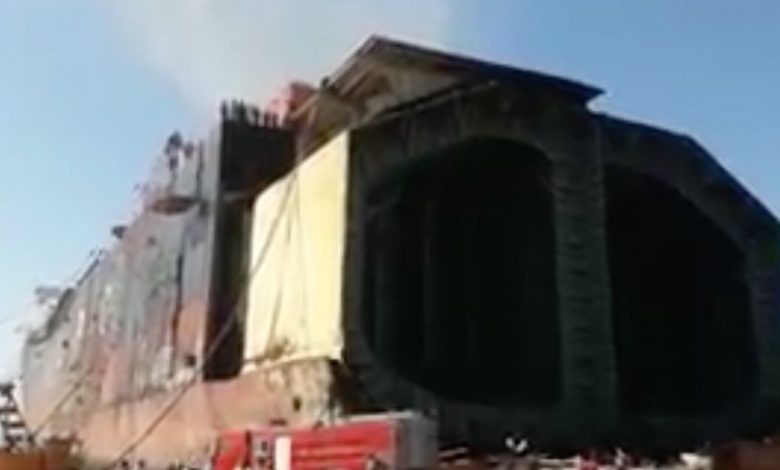
The Pakistani ship recycling centre Gadani suffered another fire yesterday. Fortunately no one was killed when welders caused an explosion while setting about dismantling an elderly LPG carrier, Chaumadra, yesterday morning.
On November 1, a fire broke out on an FSO at Gadani which raged for four days and killed a confirmed 26 people with another four still unaccounted for.
Yesterday, the Human Rights Commission of Pakistan (HRCP) launched a report on the November 1 tragedy.
The report laid responsibility of the fire on the yard’s owner, managers and contractors, Customs, Balochistan Environment Protection Agency and Balochistan Development Authority.
Key findings of the report are carried here. “There was no clarity on precisely how many workers were aboard the ship when the fire started. Many workers and the police stated that a preliminary attendance of skilled workers had been done by the contractor before they boarded the ship.
According to that list, there appeared to be at least 100 workers on board. However, by most accounts, this was not an exhaustive list and there were other workers on the ship, including unskilled workers. Their attendance data was still on the ship when the fire erupted. According to the police tally, 26 workers are dead, of which 25 have been identified. The workers called official figures inaccurate; some stating that there might have been up to 80 fatalities, not 28.
“The disaster-related infrastructure at Gadani consists of one poorly equipped rural health centre and one fire truck. All ambulances for the victims were sent by the Edhi Foundation; the Balochistan health officers admitted that a government ambulance would have taken 24 hours to arrive. All but one fire truck came from Hub and Karachi. The navy deployed two helicopters to control the fire.
“A case had been lodged against the plot owner, its manager, the main contractor and second in command or Sarangi. The main contractor, who was supposed to oversee the ship-breaking work, is said to have expired on board.
“His second in command or Sarangi and the plot No 54 manager are in custody. The owner of the vessel has escaped arrest on account of ill-health. The manger and the contractor engaged for dismantling the ship are being investigated at a police ‘safe house’. It later appeared that a cousin of the owner who also supervised all the affairs at plot No 54, a Colonel (retd) Rafiq, was not brought into the investigation and was at large.
“Ship-breaking work at Gadani is organised on a contractual basis. The ship owner’s management engages one main contractor, who then engages several sub-contractors, each of whom is responsible for a particular job or area of work.
“The contractor hires the workers and sometimes further sub-contract the work. The second in command or Sarangi of the main contractor, who is in police custody, remained unable to supply an exhaustive list of sub-contractors or teams that were supposed to be working on the ship at the time when the fire started.
“It appeared that the main contractor had been promised more work in the future if he could ensure that the ship was broken down within 45 days. The prescribed procedures for draining the ship of fuel and other inflammable substances had not been followed and workers’ attempt to cut though the fuel tank with a welding torch had started the fire. Many workers said such procedures were seldom followed and there was no attempt to enforce them.
“The Balochistan Labour Department is responsible for inspection of vessels at Gadani in order to ensure that they are safe for dismantling work to begin. There appears to be no particular law or rules defining the tasks of the labour department vis-à-vis ship-breaking; the responsibility originates from the fact that ship-breaking plots are registered under the Factories Act 1934.
Chapters II and III of the Factories Act particularly address site inspections and occupational health and safety.
https://twitter.com/sherytheketchup/status/811862579777863680
